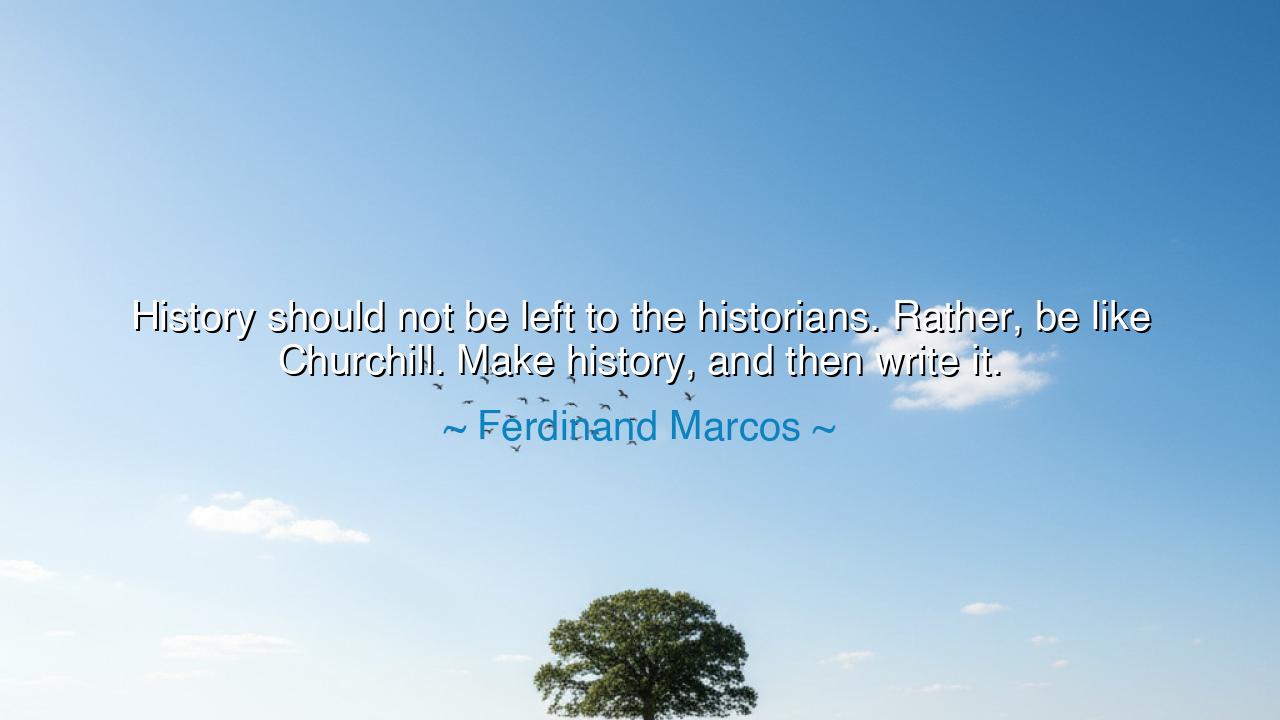
History should not be left to the historians. Rather, be like
History should not be left to the historians. Rather, be like Churchill. Make history, and then write it.






Hearken, O seekers of legacy and wisdom, and ponder the words of Ferdinand Marcos, who spoke with the ambition of kings and the cunning of statesmen: “History should not be left to the historians. Rather, be like Churchill. Make history, and then write it.” In these words is the clarion call to action, a summons to seize the currents of time rather than drift upon them, to shape the world with deeds so profound that the chroniclers themselves can only follow in your wake. Marcos reminds us that the pen alone does not make history—the hand that wields it must be guided by the life that dares to act.
History, he intimates, is not a mere record of what has passed; it is the consequence of courage, ambition, and vision. To leave history solely to the scribes is to surrender the future to the interpretations and biases of others. It is to be a silent observer while the world is molded by those who dare to act. Marcos invokes Winston Churchill, the indomitable lion of Britain, who not only guided his nation through the abyss of World War II but also inscribed his deeds and thoughts so that the generations could read and learn. He teaches that creation precedes chronicling, that one must first act in the theater of life, and only then may one narrate the triumphs and tragedies of that action.
Consider the storm-laden years of Churchill himself, when Britain stood alone against the tide of Nazism. Others might have waited, debated, or doubted; he rose with indomitable will, rallying a nation and shaping the course of history through speeches, strategies, and sheer courage. In doing so, he ensured that when the historians came, they wrote not of hesitation or fear, but of heroism and decisive leadership. History, therefore, is both stage and record, and those who dare to step upon the stage first are granted the power to influence the record itself.
Marcos’s words also illuminate the power inherent in narrative. To make history is to act; to write history is to frame the memory of that action. Yet the two are inseparable: deeds without understanding fade, while understanding without deeds is empty. A king who governs without courage may be forgotten, a general who triumphs but leaves no record may be misremembered. To live fully and wisely is to marry action with reflection, ambition with insight, and courage with clarity, leaving a legacy that endures in both deed and story.
This teaching is not solely for rulers or warriors; it is for all souls who traverse the span of life. Each choice, each act of integrity or courage, writes upon the ledger of existence. Consider the lives of the great innovators—Leonardo da Vinci, whose inventions and paintings shaped the course of art and science; Rosa Parks, whose defiance ignited a movement; or Nelson Mandela, who acted with patience and courage to reshape a nation. They made history, and in doing so, they were remembered, their stories carefully told to illuminate the lessons of their lives.
From this wisdom, a practical guidance emerges: act boldly in the sphere you inhabit. Do not wait for the chroniclers to immortalize you; instead, ensure your deeds are worthy of record. Pursue vision with audacity, lead with integrity, and take responsibility for both action and its telling. Recognize that the world is shaped not merely by observers but by those who step forward, who dare to act and, later, to reflect and record with honesty and clarity.
Marcos reminds us, too, of the fleeting nature of opportunity. History favors the bold, the decisive, and the prepared. Hesitation allows others to shape your legacy, leaving your story in the hands of those who may distort or diminish it. To seize the moment is to grasp the scepter of influence, to stand as both actor and historian of your own era. Through intentional action, one aligns the course of personal life with the currents of historical memory.
In the end, Marcos’s words are both a challenge and a beacon: do not let the pages of history be written without your hand, nor your deeds be obscured by the pen of another. Step into the arena of life with courage and purpose, act decisively, and reflect wisely. Make history, and then write it, ensuring that your legacy endures, remembered not merely as rumor or anecdote, but as testament to the power of action guided by vision, foresight, and integrity.






AAdministratorAdministrator
Welcome, honored guests. Please leave a comment, we will respond soon